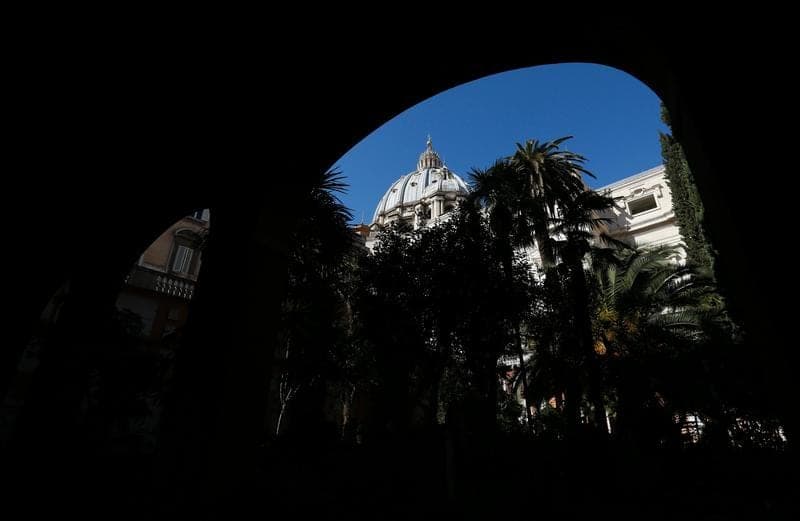ROME – Pope Francis often has praised entrepreneurs for their creativity, zeal and commitment to the projects they launch, and he’s advocated for these personalities to employ their talents to tackle global problems such as poverty and inequality.
One intriguing example of answering that call is a new initiative with the unabashedly ambitious name, “Humanity 2.0: A Shared Horizon for Humanity.”
Speaking to financiers, philanthropists, artists, tech experts, physicians, politicians and religious leaders gathered at the Vatican’s Teutonic College for a May 10 forum to discuss the organization’s vision and concrete projects, Matthew Sanders, a Canadian tech entrepreneur and CEO of Humanity 2.0, stressed that “the challenges we face are not bigger than we are.”
“All that is required to change our destiny is prudence and the will to act,” Sanders said, adding, “if history has taught us anything, it’s that humans rarely rise to the occasion unless they’re inspired by what ‘should be’, and this is why Humanity 2.0 is committed to articulating a common vision.”
One challenge which Humanity 2.0 is currently targeting is a global maternal health crisis, referred to by Morad Fareed, CEO of the Humanity 2.0 Lab, as one of modern society’s greatest concerns because “the nine months in the womb are the most important time in the universe for the human being.”
Sanders said the fact that humanity doesn’t yet have “an effective gold standard on how to optimize pregnancy to ensure the best outcomes for mother and child is astonishing,” asking, “How is it possible that the most important biological process for our species receives less funding and attention than male pattern baldness?”
Humanity 2.0 would appear to be precisely the sort of moxie harnessed to a good cause Pope Francis has been trying to encourage, perhaps explaining its warm welcome within Vatican precincts.
In a message to the 4-day World Economic Forum held in Davos in January 2018, Pope Francis urged politicians and business leaders to build just and inclusive societies focused on promoting human values and the common good.
Business and enterprise can drive this goal, he said, saying the entrepreneurial world in particular “has enormous potential to effect substantial change by increasing the quality of productivity, creating new jobs, respecting labor laws, fighting against public and private corruption, and promoting social justice, together with the fair and equitable sharing of profits.”
In November 2016, the pope hosted a private audience with a few hundred international entrepreneurs and business leaders from the International Christian Union of Business Executives (UNIAPAC), urging business leaders to bet on “the risk of using money well, the risk of honesty, and the risk of fraternity.”
“All human activity – including entrepreneurial activity – can be an exercise of mercy, while participating in God’s love for man,” he said.
Even more recently, the pope in his Nov. 7 general audience touted entrepreneurship as a solution to the problem of hunger while reflecting on the seventh commandment, “thou shall not steal.”
“If there is hunger on earth, it is not because food is missing! What is lacking is a free and far-sighted entrepreneurship, which ensures adequate production, and a solidarity approach, which ensures fair distribution,” he said.
Supported by the Vatican Dicastery for Promoting Integral Human Development, Humanity 2.0 is self-described as being a vehicle to facilitate opportunities for collaboration between the public, private and faith-based spheres placing a strong emphasis on business ethics and networking.
Big-name sponsors include Cisco, Google, Dignity Health, Pledgecamp, Crown Sterling, Falkon Ventures and Burst iQ.
The focus of the organization’s work is to identify the most urgent “impediments” to human progress, triage them, using shared data and collaboration to remove them. Tackling modern global challenges “can feel a bit like whack-a-mole,” Sanders said, in the sense that as soon as one problem is knocked down, another seems to arise.
Big and small companies around the world collapse every day, Sanders said, due to “a lack of attentiveness and respect for ethical and philosophical processes and thinking,” which he called evidence that “our economies may be growing, but they’re not sufficiently evolving.
“If we start by finding new ways to leverage aligned existing global platforms,” he said, “by bringing to bear new technologies, expertise and strategies, we stand a much better chance of making it as a species.”
One of these platforms, he said, is the Catholic Church, calling it “the largest and most influential institution in human history.”
The impact of the Church on society and culture throughout history “is unparalleled,” he said, noting that the Church is not only the largest NGO in the world, but the pope is often recognized as “the single most influential soft power on earth.”
“We aren’t looking to align peoples’ belief systems or replace the important role religion plays in people’s lives, but to provide humanity a new way to collaborate in tackling human challenges that leverages every asset at our disposal,” Sanders said, voicing hope that organization can help to build “a true human progress accelerator.”












